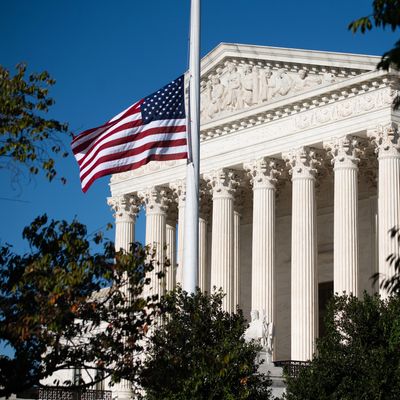
One of the major variables in the run-up to the 2020 elections is the vast wave of litigation over voting procedures in a wide array of state and federal courts. A shorthanded U.S. Supreme Court has made its basic approach to requests to intervene in election decisions reasonably plain, in an order putting aside a federal district court judge’s suspension of South Carolina’s requirement that a witness must certify the signature of an absentee-ballot voter, on an oath asserting they voted without “assistance.”
In a 5-3 decsion, with the Court’s remaining liberals siding with Chief Justice John Roberts and Justice Brett Kavanaugh, SCOTUS overruled the lower court’s action but allowed previously cast mail ballots without a witness certification to be cast so long as they arrive within the next two days. Justices Clarence Thomas, Samuel Alito, and Neil Gorsuch would have allowed the Republican-controlled state election officials toss out all the affected ballots.
Justice Kavanaugh helpfully explained the Court’s rationale in a concurrence, as reported by SCOTUSblog’s Amy Howe:
He reiterated that state officials should have “especially broad” leeway when dealing with “areas fraught with medical and scientific uncertainty.” Therefore, he continued, federal judges – who are not public-health experts – normally should not second-guess any decisions that a state legislature makes (or opts not to make) to address COVID-19 and the upcoming elections. By prohibiting the state from enforcing the witness requirement, Kavanaugh stressed, Childs ran afoul of that principle. Childs’ order blocking the witness requirement in the run-up to the November election also violated the Purcell principle, Kavanaugh continued.
The Purcell principle is a precedent based on a 2006 Supreme Court decision involving an Arizona law holding that federal courts should not intervene in state election disputes near Election Day. It’s the same principle the conservative majority of the Court relied on in overruling a federal district judge’s effort to liberalize mail-ballot deadlines prior to Wisconsin’s COVID-plagued primary in April.
Witness certifications like South Carolina’s, typically justified as a measure to prevent (largely nonexistent) mail-ballot fraud, are not only a burden on those who choose to vote by mail, but could, in a pandemic, expose voters to the risk of infection. But Kavanaugh expressed a strong willingness to defer to state determinations on such allegedly tricky balancing of interests, along with a Purcell-based concern about timing. It’s also relevant that the order involved the state’s effort to put a hold on the district judge’s ruling against the witness requirement until it could more fully justify its procedures; it’s technically not a decision on the merits of the case. In July, SCOTUS similarly granted a stay of a district judge’s ruling forcing a suspension of Alabama’s even more onerous mail-ballot witnessing requirements (though without comment in that case).
It’s unclear how much of an impact this order will have in South Carolina, a normally deep-red state with a surprisingly close U.S. Senate race underway (and even a closer-than-expected presidential contest). The permission slip for previously cast mail ballots lacking witness certifications is a small loophole, since only 20,000 absentee ballots have been received so far.
But SCOTUS is signaling an end to management of election laws this year by federal judges except in the most egregious of cases. The Purcell principle does not, however, apply to state courts, and the GOP’s petition to SCOTUS to overturn a Pennsylvania Supreme Court decision liberalizing mail ballot deadlines and other election procedures may well be the biggest case the Court will face (or, just as likely, not face) before Election Day.
It’s very unlikely this year that legal challenges to election laws and their execution will end on Election Day, of course. And the Purcell principle offers little guidance to federal courts — including the Supreme Court — on postelection disputes involving vote counting, provisional ballot adjudication, or even the Electoral College. With the president openly predicting that SCOTUS, once fortified by his third nominee Amy Coney Barrett, will decide the 2020 election, Chief Justice Roberts may struggle to maintain the perception that the Court is free from partisan politics.






























